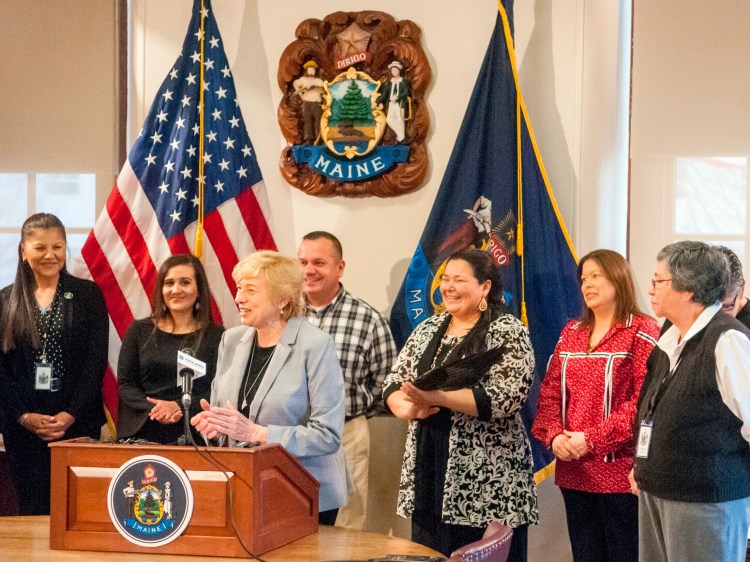WATERVILLE — If the state of Maine recognizes the second Monday in October as Indigenous Peoples Day instead of Columbus Day, the city of Waterville will also recognize it as such.
That will happen if the Waterville City Council approves a resolution Tuesday that comes two weeks after Mayor Nick Isgro proclaimed Oct. 14 as Columbus Day, eschewing a law Maine passed in April changing the state-recognized holiday to Indigenous Peoples Day.
Isgro’s proclamation, made on Oct. 1, drew backlash from those who say it was a slap in the face to indigenous people given Christopher Columbus is believed to have been responsible for cruel, abusive and murderous acts toward the native inhabitants of the Caribbean islands.

Waterville Mayor Nick Isgro reacts to comments from Kristen Price, of Waterville, as she denounces Isgro’s proclamation declaring Oct. 14 to be Columbus Day. The exchange occurred during the community comment portion of a City Council meeting at Chace Forum.
The resolution the council will consider approving Tuesday calls on the city to follow all state-recognized holidays. It reads, “Be it resolved by the Waterville City Council, acting as the governing body for the city, that the city recognizes the titles of all holidays as determined by the state.”
The resolution is being proposed by Councilors Mike Morris, D-Ward 1, and Jay Coelho, D-Ward 5.
But Morris and Coelho said the proposed resolution has nothing to do with Isgro.
Both said the city posted a notice saying City Hall offices would be closed for Indigenous Peoples Day, and that someone modified the notice and put it on social media with all of the same information except replaced “Indigenous People Day” with “Columbus Day.”

Councilor Mike Morris, D-Ward 1, listens as Nick Isgro reads his mayoral proclamation for Columbus Day during a City Council meeting Tuesday at the Chace Forum.
Morris and Coelho said if the council passes a resolution declaring the city will recognize holidays the same way the state does, it will alleviate confusion among residents. Coelho said he also thinks a mayoral proclamation should be for recognizing achievements and helping to raise awareness about something.
“I don’t think a mayoral proclamation should be anything political or controversial,” he said.
The council meeting is scheduled to begin at 7 p.m. in the Chace Community Forum at the Bill & Joan Alfond Main Street Commons downtown.
In other matters, Morris and Coelho are proposing the council vote to buy two used ambulances for up to $131,000 to show the city has the equipment to start its own ambulance service.
Coelho said once the city buys the used equipment, it can petition the federal government to upgrade the equipment to new.
“You must own the equipment before petitioning the state to transport (patients),” he said.
Coelho and Morris helped launch a city committee two months ago to study Fire Department needs and say they think the city’s having its own ambulance service would create revenue for the city and streamline residents’ needs.
They said they have been working with fire Chief Shawn Esler on developing an initial 18-month program. Morris said it would start in January, but the city would need to hire more staff and the council would have to approve any funding for staff or purchases.
Esler did not immediately return a call seeking comment.
Now, the city’s rescue trucks respond to incidents such as vehicle crashes, but do not drive patients to hospitals. Delta Ambulance has done that for many years.
Coelho said Delta, a nonprofit that does not pay taxes to the city, could still operate in the city. Morris and Coelho recently formed a committee to try to get nonprofit organizations to voluntarily give the city money in lieu of taxes. Nonprofits are not required by law to pay taxes.
While the full council has not publicly discussed in any detail the city’s desire to form an ambulance service, Coelho says the councilors know about the plan.
“I believe that we have enough support to pass this as it is right now,” he said.
Several years ago, the city discussed having its own ambulance service but officials researched the topic and decided it would not be cost-effective.
Send questions/comments to the editors.




Comments are no longer available on this story